What to Expect When Gordon Ramsay Comes Calling
Posted by estiator at 10 July, at 03 : 14 AM Print
Reality Show Nightmares
BY CONSTANTINE N. KOLITSAS
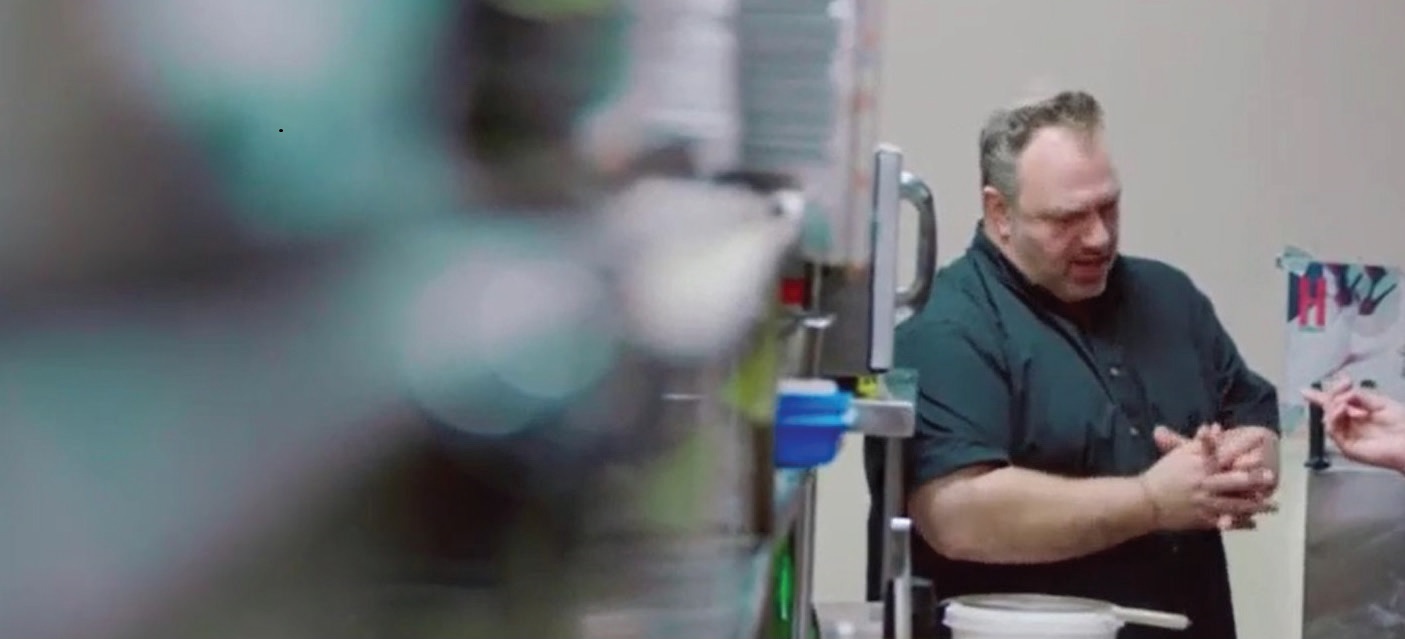
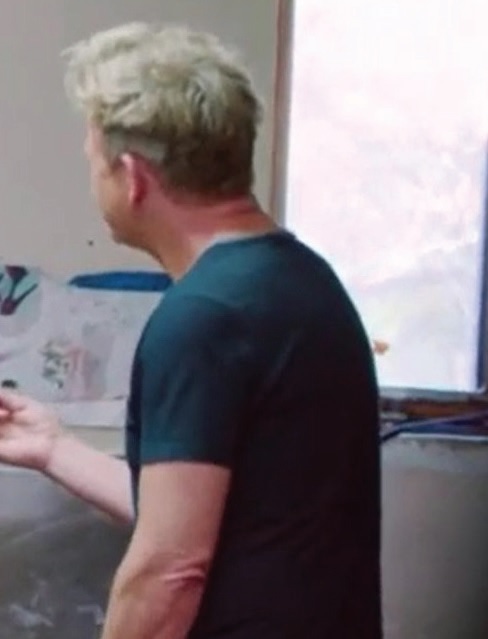
After wrapping the last episode of his show’s seven-season run in 2017, notorious celebrity chef Gordon Ramsay has rebooted “Kitchen Nightmares” as “24 Hours to Hell and Back”, adding a huge 18-wheel touring kitchen with a giant digital clock display that winds down the minutes and seconds that he and his team have to remodel the subject restaurant, play mind games with the staff, and reinvent the concept. In the third installment of the show’s winter season, that subject restaurant was Vasi’s Restaurant and Bar, in Waterbury, Connecticut, owned and operated by Vasilis (“Vasi”) Kaloidis.
“I was on the internet, I believe on Facebook, when a pop-up appeared, asking if I would be interested in renovating my restaurant,” says Vasi, who had been running the restaurant since he purchased it 17 years ago. Out of curiosity, he followed the prompts and answered some questions. A month later he was contacted.
“Would you be interested in renovating?” was the message he received, to which he replied “Sure, why not? LOL,” indicating that, at this point, this was just a curiosity for him. Within a month, a dialogue was underway with some television producers, although they did not reveal their affiliation with any specific show.
“They wanted to know our story, who we are and how we got to where we are now,” says Vasi.
The restaurant that bears his name had been one of his city’s busiest Italian restaurants for many years, but, with a years-long highway project that choked traffic in the area, and new restaurants opening in locations that were easier to access, he saw business begin to slowly erode with a catering room addition becoming his bread and butter. His dining room and bar needed some fresh ideas and a fresh look. And like many restaurant owners, the fatigue and stress were getting to him.
“We didn’t know it was FOX, and we certainly didn’t know it was Gordon Ramsay,” says Kaloidis, as the dialogue with the producers got increasingly serious. “In fact, we told them that we were up for anything except John Taffer (host of “Bar Rescues”, a similar reality show focused on the bar side of the hospitality industry) or Gordon Ramsay.” Vasi, however, failed to get this in writing, trusting that his wishes would be followed.
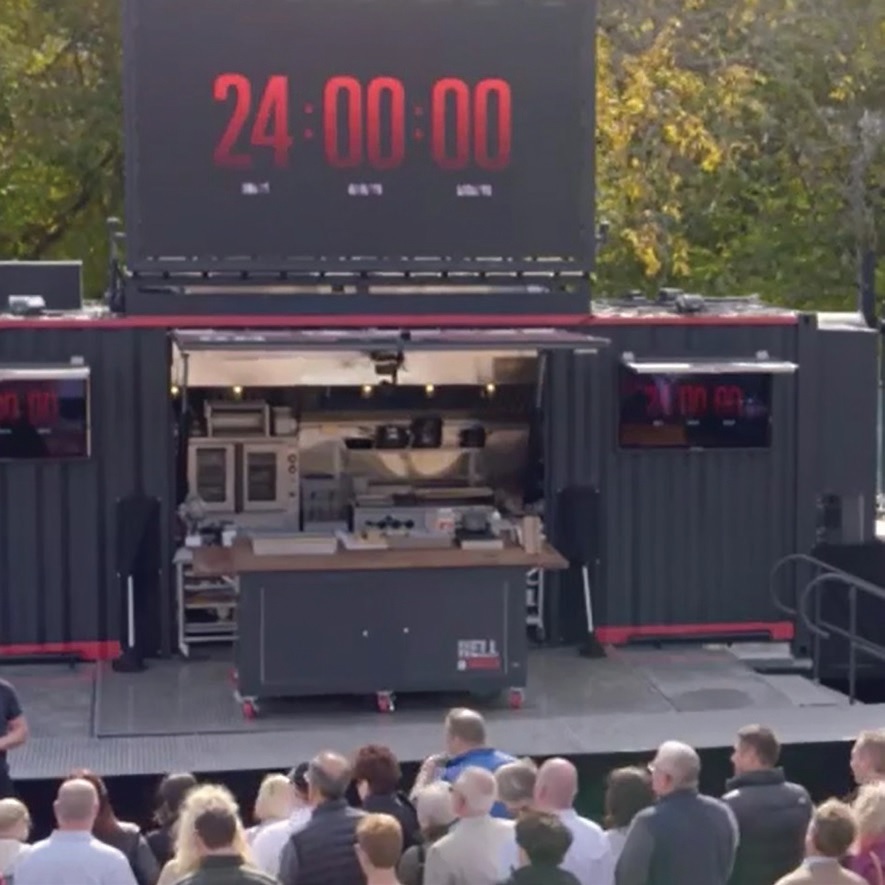
The episode that first aired in March, tells the story: A second generation restaurateur from a Greek family becomes reliant on his widowed mother (a hardworking Greek immigrant who is running her own successful pizza restaurant) for help in keeping his struggling business afloat while tensions with the chef and staff take their toll on the business. And in comes Gordon Ramsay to the rescue.
Ramsay, for those unfamiliar, is a soccer – player – turned – celebrity – chef, famous for expletive – laced invectives and pedantic know-itall-snobbery when it comes to relationships, food and the restaurant business. His popular reality-TV shows almost always follow a pattern: Restaurant is ready to close; Ramsay comes and tastes the food, which is invariably awful (often despite reviews to the contrary online and elsewhere); Ramsay goes into the kitchen and finds one or two cleanliness issues, sometimes significant, sometimes hyperbolized to seem significant; Ramsay wages psychological warfare on the owners and staff, which makes for great reality-TV drama;
Ramsay gives the restaurant a makeover because, naturally, everything about the place is wrong; Ramsay has his team remodel the restaurant, plays peacemaker amongst the restaurant team, changes the menu, teaches them how to cook and reopens the restaurant to rave reviews. Of course, during the first dinner service following the makeover everything starts out good and then goes haywire, requiring Ramsay to ride in on his white horse to fix the shift so that, by the episode’s end, it looks as though the restaurant is back on track and poised for success. Most on-line sources indicate his success rate is about 60%, with 40% of the restaurants he “saves”, eventually failing. Other websites indicate his track record is much worse, with less than 25% actually surviving.
“Up until two weeks before, we thought the producers were working on a renovation show on a small cable network or affiliate,” says Vasi. A group of eight people came to his restaurant, took measurements and spoke with members of the staff. A short time later, in July, when the restaurant is slowest, they came and took some footage of the restaurant. “They asked to look at some of our financials, and did more interviews,” says Vasi.
In September, they called again. “They said that they liked the Greek angle, they liked my mom, my wife and kids… They saw a disconnect between the owner and the staff and said the food was good, but needed a little boost. And at the time, I still didn’t know that they were working for a show on FOX.”
So, Vasi moved forward, convincing the staff that it would be good for them and for the restaurant.
In October, he received a call saying that they would be coming in a couple of weeks. Soon after they received another call saying that the time frame had changed – that they would be there in two days. The 70-person party he had booked for that date had to be moved to a nearby facility.
The producers and camera crew landed on a Sunday night and had Vasi meet them at the restaurant at 8:30 the next morning (the restaurant is closed Mondays).
“While I was there, I saw the 18-wheeler with Gordon Ramsay’s name drive by and pull in behind,” says Vasi. “They were trying to get in without me knowing,” he adds, indicating the first time he was aware which show he had signed onto.
Vasi, of course, was familiar with Ramsay’s reputation, but had never seen an episode of the bad-boy chef’s shows. His first thought was to back out – he had told the producers that he was up for anything except Ramsay or Taffer’s shows. But thinking it through, he decided to continue. There was nothing in writing to support his claim, and he was contractually committed.
So, he went home and, with his wife Lauren, binge-watched episodes to prepare for what was to come. “I don’t think either of us slept that night,” he says.
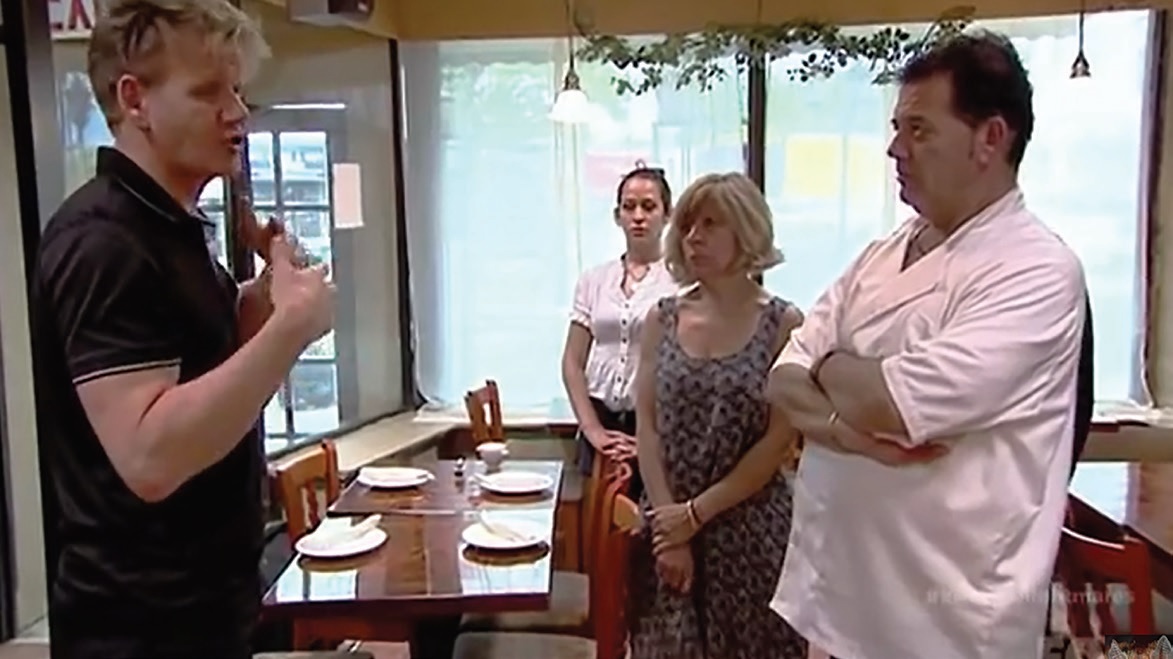
Ramsay confronts the owners of Kati Allo in the final season of “Kitchen Nightmares”
But the uncertainty wasn’t confined to him and Lauren; the staff was not receptive to the idea of being subjected to Ramsay’s tirades. “As soon as they saw the truck, the staff wanted to quit,” says Vasi, who had to go into recovery mode to get everyone on board at the last minute.
The production team spent Tuesday night filming their normal dinner service and on Wednesday they were asked to open for lunch (the restaurant typically opened at 3:00PM).
“We recognized him immediately,” says Vasi, referring to the show’s new set-up, where Ramsay enters the restaurant disguised as a patron.
From there, the events followed the formula: Ramsay was critical of the food, ripped apart the menu and went into the kitchen, mostly yelling at everyone. As a result, his chef, as the episode showed, walked out. Vasi followed her to the parking lot, and leveraged their long relationship in order to convince her to come back.
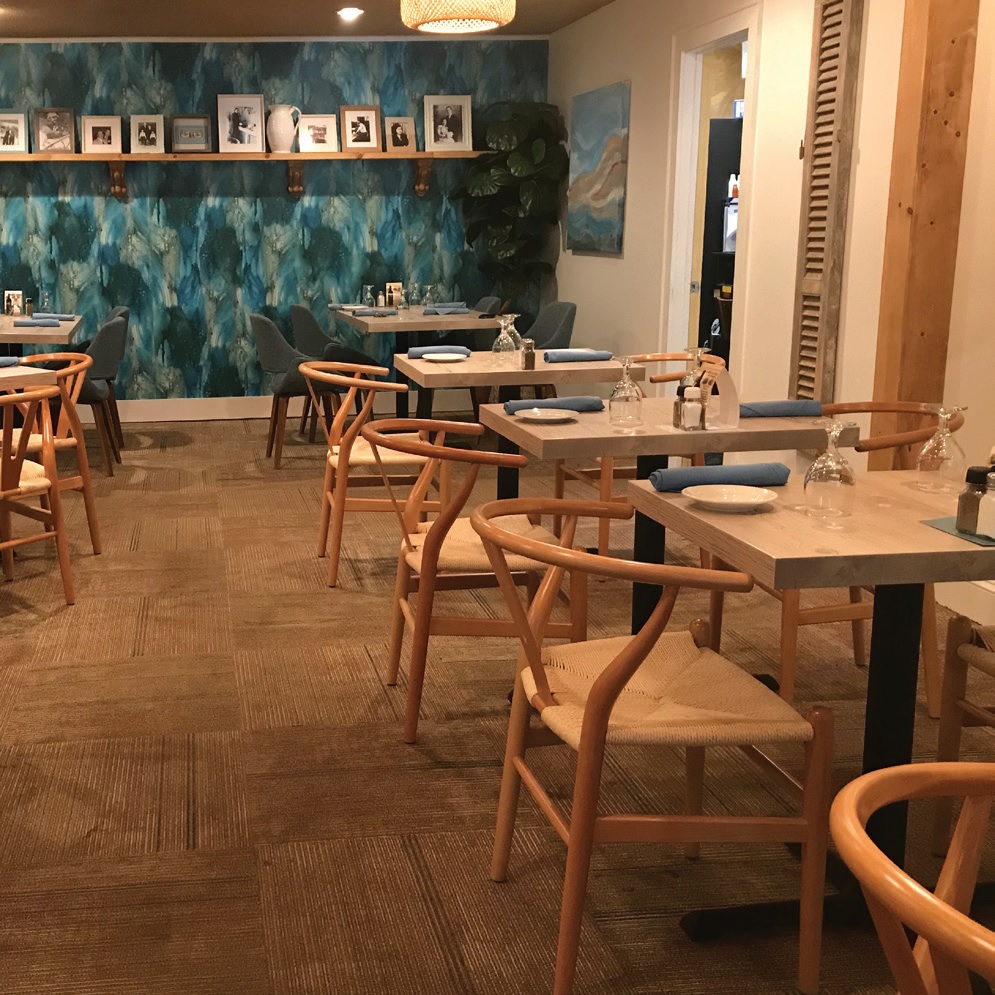
The dining room at Vasi’s Taverna
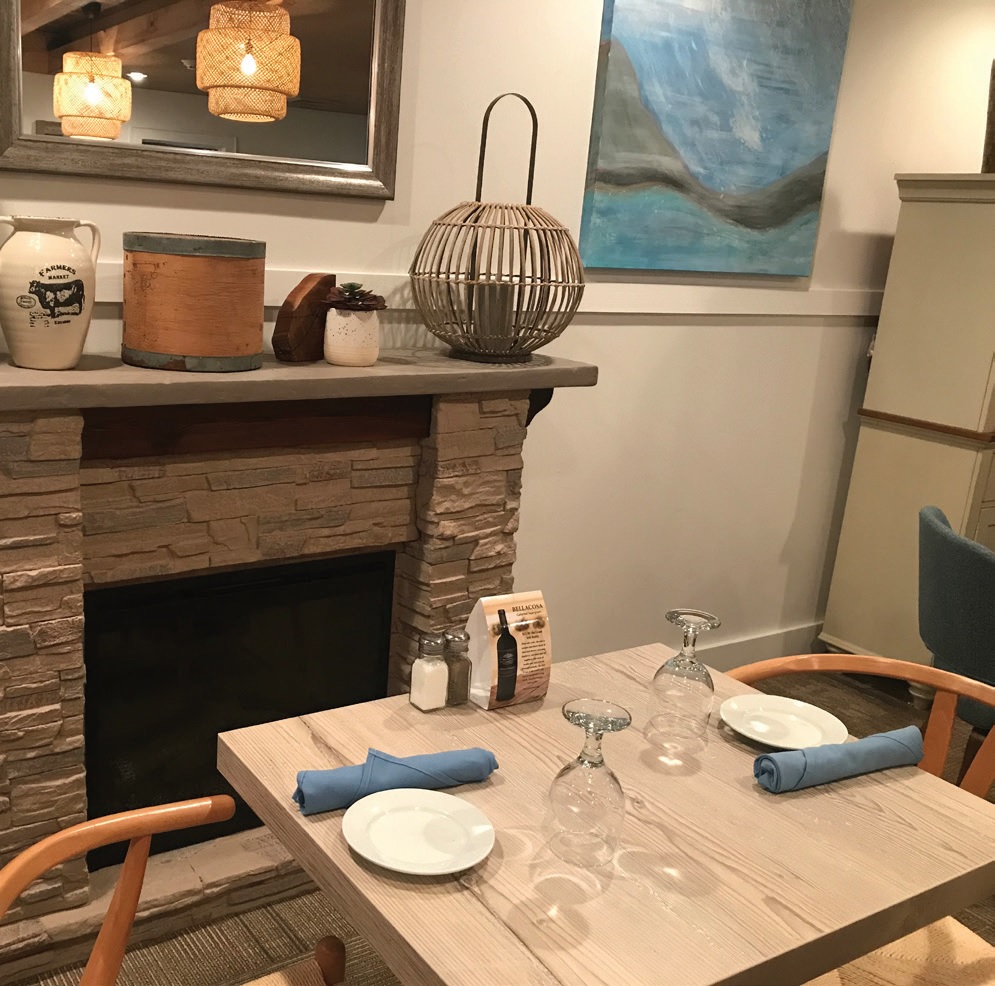
The new look at Vasi’s Taverna is a tasteful tribute to the family’s history and heritage
Meanwhile, the construction team went to work demolishing the restaurant’s dining room.
By this time, the crew had been to the restaurant several times, so they had a design in place, and fixtures, furnishing and equipment ready to go.
The entire staff stayed until after midnight while the construction crew worked through the night. Within twenty-four hours the restaurant was done and, as the clock mounted on the 18-wheeler counted down the seconds, the restaurant was opened, first to Vasi and his staff, and soon after, for the crowd of over one hundred people that were waiting outside, along with news vans.
It’s been over six months since the experience, and three months since the episode aired. The restaurant was re-Christened as “Vasi’s Taverna”, incorporating traditional Greek fare and elements from the restaurant’s longstanding northern Italian menu, bringing guests on a culinary journey “From Rome to Athens”.
The original menu, with over 50 items, was cut in half, says Vasi, of the concept overhaul that Ramsay oversaw. And while the restaurant’s large tap room and banquet hall were not touched by the show’s construction team, the main dining room was completely, and very nicely, transformed. Gone were the black-leather-lined wood booths that defined the space. In their place: wicker-enclosed chandeliers; a colorful wall with waves of seagreen and blue; a stone fireplace; bleached wood tabletops and chairs; rustic cabinets; and vintage family photos from Greece and the U.S., all telling the story of the family’s Hellenic roots, tastefully and with warmth. And along with the free renovations, the show brought some new kitchen equipment, plateware and smallwares to add to the restaurant’s ambience.
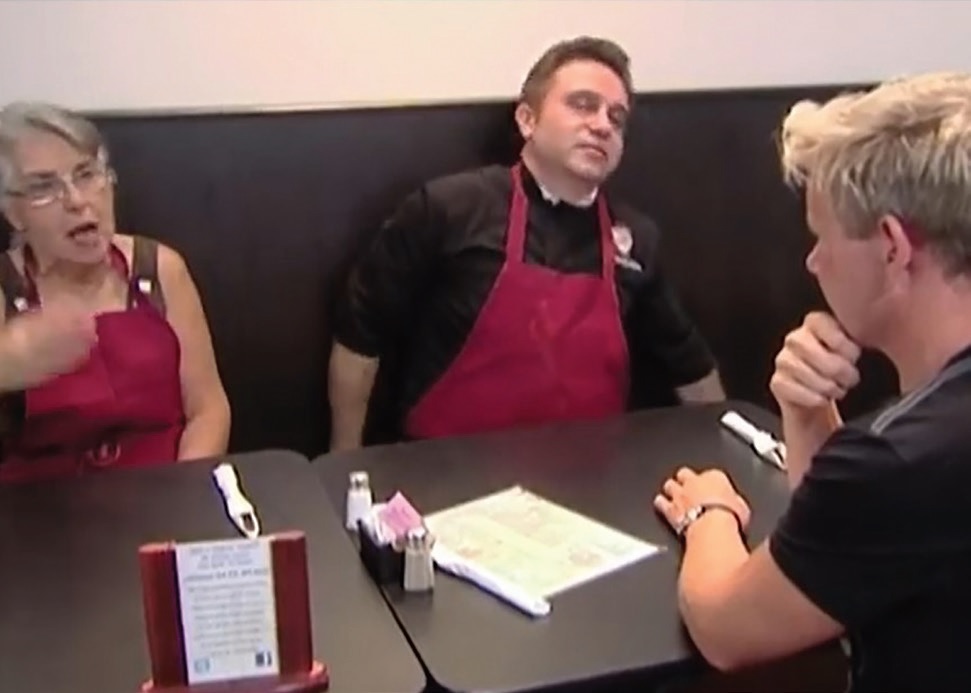
Mother and son at El Greco in Austin suffer through a painful session with Ramsay that brings out their relationship’s underlying dysfunction
“Everything between him and me was real,” says Vasi of the often contentious interactions he had with the show’s star. And although he bore the brunt of Ramsay’s storied rants, he feels that, even considering the fact that the show followed a set formula, the celebrity chef was sincere.
“Lauren sat down with him and came away with the impression that he really cares,” says Vasi. And as for his mother, Toula, who is featured prominently in the show, she told Vasi to “be nice to Mr. Ramsay”.
“’Don’t you see him yelling at me’, I told her. ‘Yes,’ she said, ‘but he’s a very nice man, you should be nice to him.”
Asked if he would go through it again, however, Vasi is indecisive. “I’m 50/50 on it,” he says. “I’m glad the renovation happened, and I appreciate it. But the stress on the family, on the staff and on myself is not something I would go through again.
”As for business, there was an immediate uptick in the first three months, but has begun to level off, says Vasi. There are still people that look for the French onion soup, while others are excited about the fresh fish and octopus.
“People from all over are still coming because of the show,” he says.

Toula Kaloidis shows her appreciation for the work that Ramsay did for her son’s restaurant
GORDON VS THE GREEKS
Vasi’s in Waterbury is not the first foray into Greek restaurantdom for chef provocateur Gordon Ramsay. On his “Kitchen Nightmares” show, he has taken on Greek restaurants on at least four previous occasions, including Austin’s El Greco in Season 5; Yanni’s in Seattle in 2013; The Greek at the Harbor in Ventura, California in Season 4, and Kati Allo, in Flushing, Queens, just a stone’s throw from Astoria, the unofficial capital of Greek America, in Season 7. Of those, Yanni’s and The Greek at the Harbor remain open, while Kati Allo and El Greco have either shuttered or been sold. The episodes, which can be seen online, are full of Greek drama, particularly the episodes for the two defunct eateries. In the case of Kati Allo, Ramsay’s show exploits the failing marriage of Manolis and Christina, who got into the business on a whim (Manolis, who had previously never worked in a restaurant, went for a haircut and purchased the restaurant next door that he noticed was for sale.
After several years of initial success, the show brought out what happens to a business when fatigue sets in: the couple placed blame on one another when things started going downhill; Manolis became a part-time operator, leaving his wife to largely run the place on her own; the kitchen resorted to short cuts, serving food that seemed to be mediocre…
And, of course, there were the financial ramifications: Manolis and Christina had put the house in hock to keep the place open. According to the website realitytvrevisited.com, the restaurant closed days after the episode aired in April 2014. During the seven months it was open after Ramsay’s makeover (the previous July), the restaurant had mixed reviews. In its place, came Kalamaki GR, which has gone on to win awards for its Greek cooking, and continues to draw crowds.
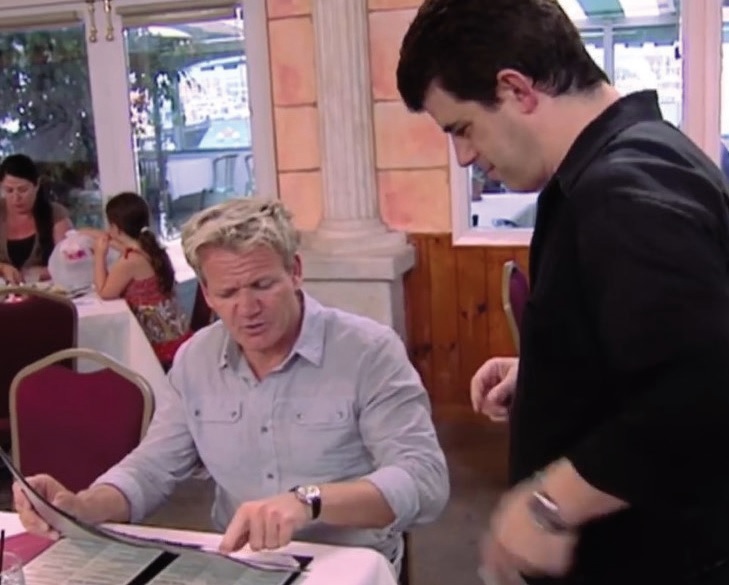
“Kitchen Nightmares”, Gordon Ramsay places an order at The Greek at the Harbor in Ventura, California in 2011
















